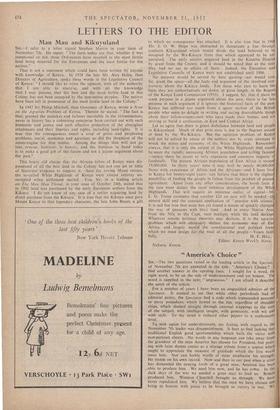LETTERS TO THE EDITOR
Mau Mau and Kikuyuland.
SIR,—I refer to a letter signed Stephen Martin in your issue of November 7th. He states: " The facts today are that, whether it was intentional or not, these Ordinances have resulted in the most fertile land being reserved for the Europeans and the least fertile for the natives."
That is not a statement which could have been written by anyone with knowledge of Kenya. In 1928 the late Mr. Alex Holm, then Director of Agriculture, spoke these words in the Legislative Council of Kenya: "I should like to voice the opinion, with all the authority that I am able to exercise, and with all the knowledge that I may possess, that the best and the most fertile-land in this Colony has not been occupied by the non-native peoples. The natives have been left in possession of the most fertile land in the Colony."
In 1947 Sir Philip Mitchell, then Governor of Kenya, wrote a Note on the Agrarian Problem of Kenya. Therein he stated: " The fact is that, granted the mistakes and failures inevitable in the circumstances, never in history has a colonising enterprise been carried out with such humanity and justice and such effective protection of the aboriginal inhabitants, and their liberties and rights, including land-rights. It is true that the consequences entail a crop of grave and perplexing problems, social, economic and agrarian; so did the invention of the steam-engine for that matter. Among the things that will not go into reverse, however, is history, and the business in hand today is to make a good job of the future and not a jejune argument about the past."
This hoary old charge that the African tribes of Kenya were dis- possessed of all the best land in the Colony' has not one jot dr tittle of historical evidence to support it. Save for roving Masai reivers, the so-called White Highlands of Kenya were almost entirely un- occupied when settlement started. You, Sir. in a leading article on The Mau Matt Threat, in your issue of October 24th, stated that in 1902 land was purchased by the early European settlers from the Kikuyu. I do not know of any case of a settler acquiring land by direct purchase from the Kikuyu. It is true that the Kikuyu once gave Mount Kenya to that legendary character, the late John Boyes, a gift to which no consequence was attached. It is also true that in 19 Mr. J. 0. W. Hope was instructed to demarcate a line throug southern Kikuyuland which would divide the land believed to b3 occupied by the Wa-Kikuyu from that which appeared to be un- occupied. The early settlers acquired land in the Kiambu District by grant from the Crown; and it should be noted that at the time they had no say in affairs of State. Indeed, the Executive and Legislative Councils of Kenya were not established until 1906.
No purpose would be served by here quoting—nor would you. Sir, grant the space—all the facts and argument of the involved con- troversy about the Kikuyu .lands. For those who care to learn the facts they are authoritatively set down, at great length, in the Report of the Kenya Land Commission (1933). 1 suggest, Sir, that if there he scant purpose in a jejune argument about the past, there is far less purpose in such argument if it ignores the historical facts of the past. Kenya has suffered too much from a queer section of the British people who seem to delight in .writing and saying discreditable things about their fellow-countrymen who have made their homes, and are
striving to build a civilisation, in East and Central Africa. ,
Let us agree that there is grave disbalance between land and people in Kikuyuland. Much of that grim state is due to the flagrant misuse of land by the Wa-Kikuyu. Rut the agrarian problem of Kenya will not be solved by abuse of the settlers; nor by crazy attempts to wreck the status and economy of the White Highlands. Remember, always, that it is only the output of the White Highlands that stands between the rapidly' increasing African population and killing famines —unless there be resort to very expensive and extensive imports ot foodstuffs. The present African population of East Africa is around 19,000,000. In thirty years' time ' it may well be nearly 40,000,000• None with experience of Africa and the Africans—and I have lived in Kenya for twenty-eight years—can believe that there is the slightest possibility of feeding the people in future from the product of peasant agriculture. Apart from any other consideration, the harsh facts of the case must dictate the most intensive development of the White Highlands.- That will require an immense outlay of capital—Mr, L G. Troup estimates that another £20 an acre will be needed—the utmost skill and the constant application of " practice with science,''. It is sad but true that none has yet found a means of quickly changing the way of peasants with their land. And in every Native Area from the Nile to the Cape, men multiply while the land declines Whatever remote political theorists may declaim, it is the agrarial problem which will ultimately dictate the economic way of Easl Africa, and.,, largely mould the constitutional and political fornf which we must design for the weal of all the people.,—.Yours faith
fully, M. F. HILL.
Editor, Kenya Weekly News.
Nakuru, Kenya.










































































 Previous page
Previous page